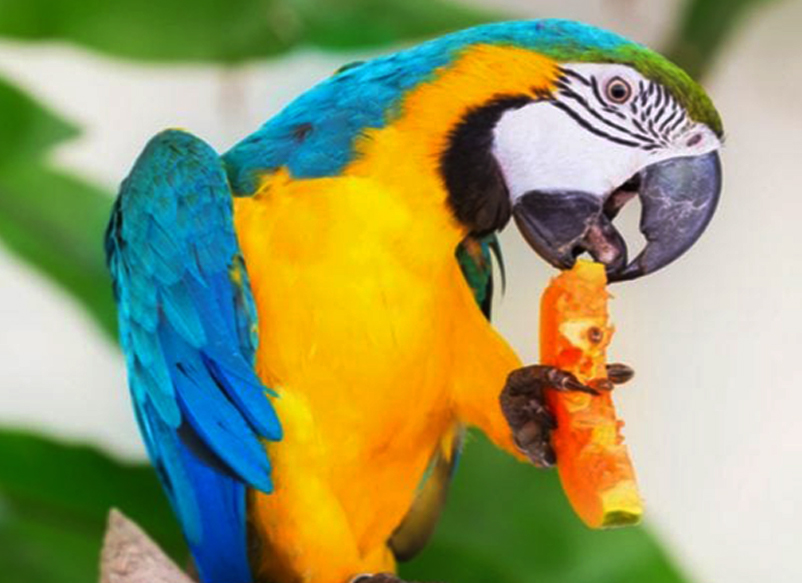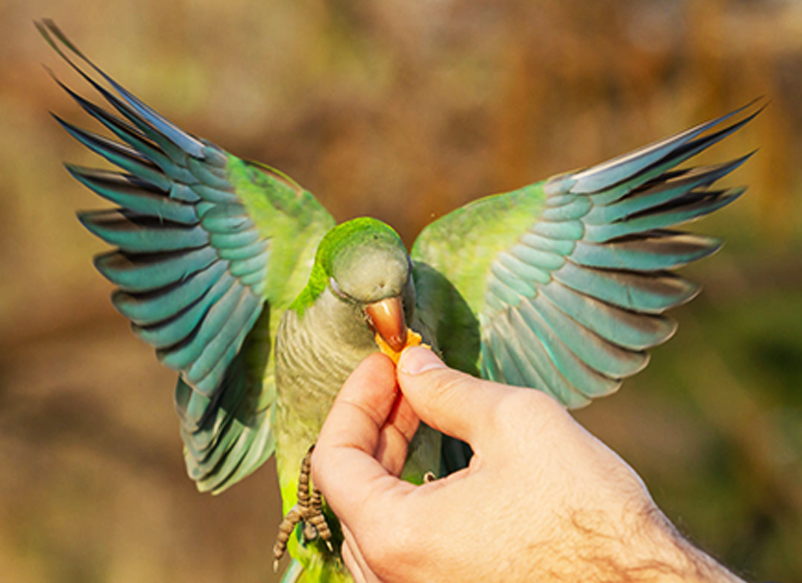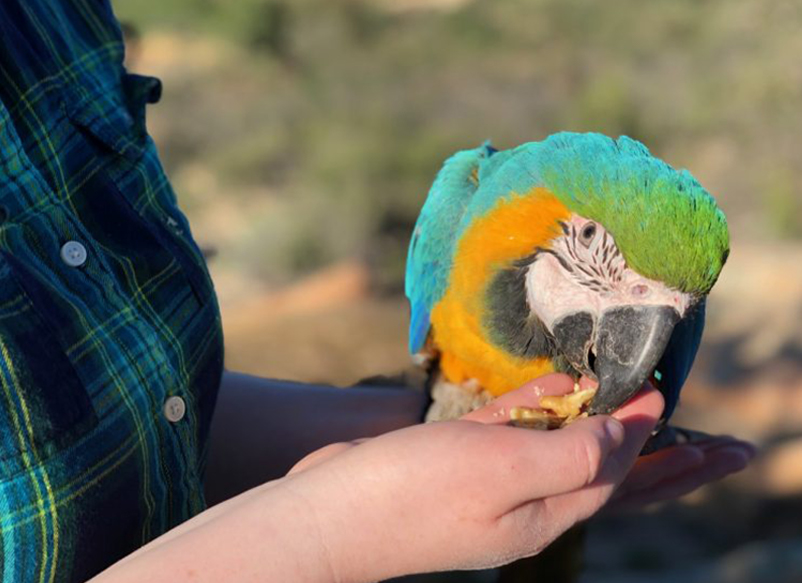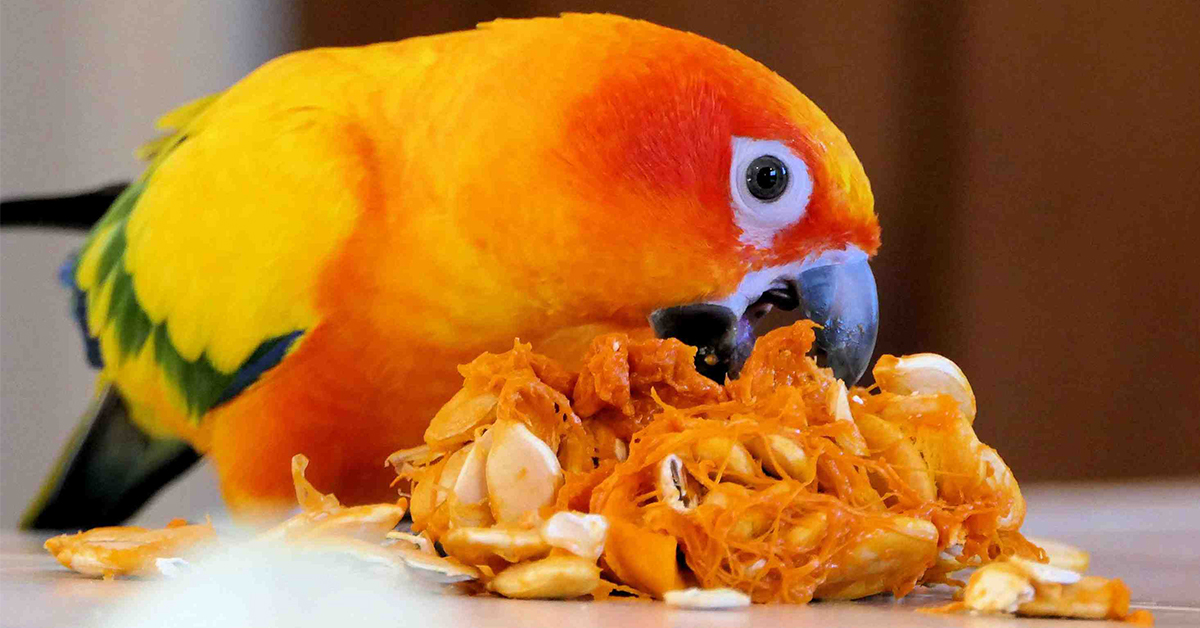Vibrant, intelligent, and social, parrots are known not only for their capacity to mimic the sounds of human speech but also because they have specific eating habits. The curiosity about what do parrots like to eat is not alone. Feeding your parrot requires much more than providing it with birdseed; the diversity of its personality should be reflected in its diet. Ideal foods for your parrot This guide shall briefly outline the best diets for parrots, why a balanced diet is important, and what to avoid feeding them.
What Do Parrots Like To Eat and how much to feed
Feed your parrot fresh fruits and vegetables, seeds and nuts, and high-quality pellets. Fresh apples, carrots, and leafy greens will give your parrot the necessary vitamins and fiber. Seeds and nuts should be supplemented only in modest proportions since they are rich in fat. Pellets formulated for parrots can be served as a staple to ensure that your parrot obtains all the nutrients needed.
When it comes to quantity, feed your parrot about 1/4 to 1/3 cup of pellets daily, supplemented with a variety of fresh fruits and vegetables. Avoid overfeeding foods with high calories while making sure that fresh water is always available.
Parrot Eating Food List
- Fruits: These are a large favorite of parrots, high in vitamins and antioxidants. The fruits’ natural sugars give them energy. Some fruits include apples, bananas, berries, grapes, mangoes, pineapples, and papayas. However, fruits should be presented in moderation as a surplus can lead to obesity or other health problems.
- Vegetables: These are another major component of the diet of a parrot. They may contain little calories but are very high in fiber, vitamins, and minerals. Leafy greens such as kale, spinach, and collard greens are always favorites as well as vegetables like carrots, broccoli, bell peppers, and peas. Many parrots also take a liking to sweet potatoes, cucumbers, and zucchini.
- Seeds and Nuts: Seeds and nuts are some parts of traditional food that should be fed to parrots but in a smaller measure. Seeds have high-fat content, especially sunflower seeds, and a high amount of them could lead to obesity. Parrots love other nuts such as almonds, walnuts, and hazelnuts, which are unsalted and provided in limited amounts due to their high content of fat.
- Pellets: Pellets are a popular food source for parrots, at which feeders are commercially prepared to give a balanced meal. Most pellets consist of a mix of grains, seeds, vegetables, and vitamins, which will provide all the nutrients in one meal to your parrot. Still, pellets alone cannot make up the diet of a parrot; fresh foods must always be included for variety and enrichment.
- Protein Sources: Parrots need protein from which to grow their muscles, maintain healthy feathers, and otherwise stay healthy. Protein sources include insects and small animals in the wild. For parrots in captivity, you can provide them with cooked eggs, beans, lentils, and even small pieces of cooked chicken or fish. Ensure any animal proteins are well-cooked to avoid any bacteria or parasites.
- Grains and Legumes: Cooked whole grains, which include quinoa, rice, oats, and barley, may be added to a parrot’s diet. These grains have complex carbohydrates and fiber that add to the diet of your parrots. You may also feed cooked beans, lentils, or chickpeas, which are some excellent sources of plant-based proteins.
- Water: All birds need constant access to fresh, clean water. Water aids in digestion and absorption of nutrients, as well as keeps their feathers healthy. Drinking from a shallow dish of water that they can splash around in is also enjoyed by most parrots, creating added fun in the parrot’s life.

What Do Parrots Like To Eat in Fruits
Parrots just love fruits since they contain crucial vitamins, minerals, and antioxidants that help them live healthy lives. Good fruits for parrots include apples with seeds removed, pears, grapes, and bananas. Berries like strawberries, raspberries, and blueberries are good owing to their antioxidant property. Tropical fruits such as mangoes, papaya, pineapples, and kiwi are very good for their vitamin C content with the promotion of a healthy immune system.
Fruits like watermelon, peaches, and nectarines are good choices, provided pits or seeds are removed to avoid toxicity. Pomegranate seeds are yet another healthy snack – a good source of dietary fiber and antioxidants.
Fruits are to be fed in moderation; they are packed with naturally occurring sugar. A balanced diet that includes a variety of fruits, vegetables, seeds, and pellets will ensure that your parrot is getting all the nutrition it needs to reach its full potential and be in its best health and happiness. Always wash fruits before offering them to your parrot.
What Do Parrots Like To Eat in Vegetables
Parrots love a good variety of green vegetables, which provide essential nutrients for their health. When considering what do parrots like to eat, leafy greens such as kale, spinach, dandelion greens, and collard greens are all excellent choices. These vegetables are packed with vitamins A, C, and K, helping to maintain overall health. Other great options include cruciferous vegetables like broccoli, Brussels sprouts, and cauliflower, which offer additional nutrients and fiber.
Carrots, sweet potatoes, and squash are rich in beta-carotene, essential for healthy vision and immune function. Bell peppers, both sweet and mild, provide vitamin C to boost immunity and are a colorful treat for your parrot. Additionally, zucchini, cucumbers, peas, and corn are hydrating, fiber-filled options that parrots enjoy.
When considering what do parrots like to eat, it’s important to chop vegetables into bite-sized pieces and avoid those with pesticides. Offering a variety of vegetables is key to providing a balanced diet. Rotate different veggies regularly to ensure your parrot gets a wide range of nutrients. Remember, diversity in their diet is crucial to keeping your parrot happy and healthy, as they thrive on variety. So, when you ask what do parrots like to eat, the answer is clear: a colorful mix of fresh, nutritious vegetables.

What Fruits Can Birds Not Eat
While most fruits are safe for parrots, some can be toxic or harmful, so it’s important to carefully consider what do parrots like to eat. For example, avocados should always be avoided, as they contain persin, a toxin that can lead to heart failure and respiratory distress in parrots. Additionally, the seeds or pits of fruits like cherries, peaches, plums, and apricots contain cyanide compounds, which are lethal to parrots and should never be fed to them.
Citrus fruits, including oranges, lemons, limes, and grapefruits, are not toxic but can cause digestive upset in some parrot species. These fruits also tend to be acidic, which may not sit well with every bird. Moreover, overly ripe or dried fruit can have higher sugar content, which may lead to obesity if consumed excessively. When considering what do parrots like to eat, always opt for fruits that are safe and balanced in sugar levels.
Before offering any fruit, it’s essential to research specific types to ensure their safety for your bird. If you’re unsure, it’s best to avoid fruits known to pose risks. By understanding what do parrots like to eat, you can offer your parrot a safe, healthy, and enjoyable diet.
Parrots and Protein
Parrots must have a proper diet to stay healthy; their protein content is vital for them. Protein is fundamental to their growth and feather development, immune functions, and general strength. In the wild, parrots acquire their protein from seeds, nuts, fruits, and even insects. Still, in captivity, a balanced diet must ensure the intake of high-grade pellets, fresh vegetables, and other protein-rich foods such as legumes, eggs, and tofu. A healthy parrot requires a balanced intake of essential amino acids, hence a variety of protein sources. Overfeeding protein, however, can be a very bad thing as it results in obesity among other things, so portion control is a must.
Pellets or Seeds
There is an argument between pellets and seeds, but what matters most is understanding the nutritional differences. Truly, pellets are often a more balanced and complete diet for parrots because they contain essential vitamins, minerals, and nutrients for a healthy diet. Most commercial pellets are designed for parrot-specific nutritional needs to avoid nutrient deficiencies and obesity brought on by selective eating habits.
Seeds, although a natural part of the diet of parrots in the wild are less nutritionally complete as a stand-alone food. They can be high in fat and low in many of the essential vitamins and minerals. However, parrots may also pick their favorite seeds, so providing only seeds may result in an unbalanced diet. Seeds are, however, a great source of tasty and enriching treats provided moderately as part of a varied diet.
A good diet for a parrot would be comprised of both pellets and seeds supplemented with fresh fruits, vegetables, and other healthy foods.

Feeding Your Parrot Nuts
This could be one of the healthiest and most enjoyable activities if shared in moderation-providing your parrot with nuts. A source of protein, healthy fats, and vitamins and minerals like vitamin E, magnesium, and zinc, nuts additionally support a healthy feather, immune system, and overall well-being of your parrot. Some nuts available for parrots include almonds, walnuts, cashews, and pistachios, but do not use just one kind of nut; instead, give several to ensure proper nutrition.
Nuts are fed in limited quantities because they naturally contain a high percentage of fat. Overfeeding leads to obesity, one of the common problems seen in captive parrots. Nuts should be unsalted and unseasoned because excess salt and additives are unhealthy for your bird. Avoid offering your parrot nuts still in their shell, because some may have difficulty cracking them open while others may choke if the nut is large enough.
However, because nuts are considered one of the greatest sources of enrichment for your parrot, balance it with other foods including fresh fruits, vegetables, and pellets. The provision of nuts as a one-time treatment or foraging opportunity might keep your parrot mentally stimulated and relatively happy. Monitor their weight and health regularly and adjust the portions accordingly to maintain them at optimal levels.
Related: Can a Parrot Get Dehydrated?

